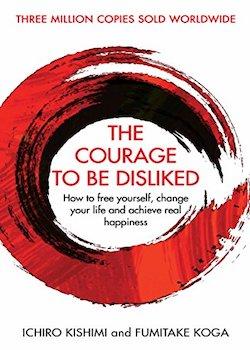The Courage to Be Disliked

By Kishimi Ichiro and Koga Fumitake
Allen & Unwin, 2018
ISBN-13: 978-1760630737
Review by Charlotte Goff
Published in Japan in 2013, The Courage to Be Disliked promises to show readers ‘How to free yourself, change your life and achieve real happiness’. However ambitious these promises are, there is clearly an appetite for them; in the five years between its original publication and its translation into English in 2018, over three million people bought the book. Now a sensation worldwide, The Courage to Be Disliked is, at its heart, an invocation for readers to take control of their own destinies.
Thanks to these promises, The Courage to Be Disliked fits most neatly into the self-help genre. It would, however, not be out of place on the philosophy or psychology shelves. The book takes the form of conversations between two men: philosopher and youth. This is a format that philosophy students and – thanks in part to the huge success of Benjamin Hoff’s The Tao of Pooh – many general readers will be familiar with. The naïve youth tries to make sense of some of life’s fundamental questions: How am I shaped by my past? What is my purpose? How can I find happiness? The answers, the philosopher insists, can be found in the works of Austrian philosopher and psychotherapist Alfred Adler. In this way, The Courage to Be Disliked is as much as an introduction to Adlerian thought as it is a work of self-help.
In the afterword, we learn that the relationship between youth and philosopher mirrors that between the authors themselves. Just as the youth visits the philosopher hoping to make sense of life, Koga visited Kishimi hoping to learn more about Adler. The book is a product of this relationship, and of Koga’s forwardness in volunteering to be the Plato to Kishimi’s Socrates.
The conversations between philosopher and youth span subjects from trauma to social isolation, interpersonal relationships and the need to feel special. Though these are universal subjects, some hold particular cultural relevance in Japan today; we recognise the idea of the hikikomori in the youth’s ‘friend, a guy, who has shut himself in his room for several years’. The discussions are heated to begin with – ‘You think this passes for philosophy? I do not accept this at all’ – and it is the anger and doubts of the youth that provide a foil for the exposition of the philosopher’s position. I’m sure I wasn’t alone in mirroring the youth’s initial anger, and some of the chapter headings are deliberatively provocative. ‘Unhappiness is something you choose for yourself’ feels like a criticism and an assertion of blame to the youth and, perhaps, readers like him. The more I read, however, the more I (like the youth) mellowed in my reactions to these statements. The philosopher’s point is not that unhappiness is an individual’s fault, but rather that finding happiness is within an individual’s power.
Unsurprisingly given the title, courage is central to the philosopher’s theories. The message is one of hope: we can have the life we want, but only if we have the courage to cast aside the life with which we have grown comfortable. The youth lives in a kind of comfortable unhappiness – miserable, but used to being miserable. This protects him from further pain. Believing that people are fundamentally unkind, he isolates himself and cannot be rejected. Believing that the past determines his present, he can avoid taking responsibility when things go wrong in his life. These beliefs are convenient, but prevent the youth from truly living. Happiness, we learn, is found in the courage to live without fearing being disliked, to act without fearing failure.
Does the book do what it sets out to do, and grant readers freedom, change, and happiness? That, the philosopher would argue, depends on how courageous the reader is feeling.

